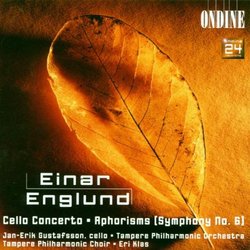| All Artists: Jan-Erik Gustafsson, Einar Englund, Eri Klas, Tampere Philharmonic Orchestra Title: Englund: Cello Concerto/Aphorisms (Symphony No. 6) Members Wishing: 0 Total Copies: 0 Label: Ondine Release Date: 6/27/2000 Genre: Classical Styles: Forms & Genres, Concertos, Symphonies Number of Discs: 1 SwapaCD Credits: 1 UPC: 761195095126 |
Search - Jan-Erik Gustafsson, Einar Englund, Eri Klas :: Englund: Cello Concerto/Aphorisms (Symphony No. 6)
 | Jan-Erik Gustafsson, Einar Englund, Eri Klas Englund: Cello Concerto/Aphorisms (Symphony No. 6) Genre: Classical |
Larger Image |
CD Details |
CD ReviewsEnglund's Nordic Sound Thomas F. Bertonneau | Oswego, NY United States | 10/03/2000 (4 out of 5 stars) "Like Sibelius, whose example he in fact tried to throw off, Einar Englund (1916-1919) stemmed from the minority Swedish-speaking element of the Finnish nation. (So did Nobel Prize winning poet Edith Södergran and so did General Mannerheim, who rallied the Finns against Stalin in the Winter War of 1939-40; Englund saw harrowing combat in that conflict.) I first got to know Englund twenty or more years ago when, on impulse, I bought an imported LP of his First Symphony. The music is mildly modern, closer to Shostakovich and Prokofiev than to Sibelius, but infused throughout by what Yoell, in his book on Scandinavian composers, called "the Nordic sound." Englund's vocabulary is close to that of the Swede Hilding Rosenberg, although Rosenberg was older by about twenty years; there is some use of "expressionist" procedures, and the harmonies are often thick and dissonant, but the music never really departs from a tonal plan and the resolutions are all distinctly key-centered and intuitively satisfying. (Englund disdained serialism.) There is a good deal of vigorous counterpoint; Englund writes a convincing orchestral fugue. But there is also much hovering in the cold and icy depths. (Very Finnish, I can hear my Swedish friends saying; they think about the Finns what we tend to think about them.) In this new CD, Ondine gives us one middle and one late work by the composer: a Cello Concerto from 1954 and a choral symphony called "Aphorisms" (No. 6) from 1984. The First Movement of the Concerto starts out meditatively but soon launches into a rhythmic "Moderato." Commentators call Englund a "neo-classicist," but this strikes me as inaccurate. If Stravinsky provides the model of neo-classicism in his revamped Brandenburgs of the 1920s and 30s, then Englund's species is in many ways a throwback to Romanticism. The material of the concerto possesses clear outlines and the development is logical and dramatic. The Adagio delivers much pathos. The concluding Allegro Deciso might remind one of Bartok, a name often invoked although somewhat misleadingly, in discussions of Englund. The Sixth Symphony is a different kettle of herring altogether, being in six movements, four of which set fragments from the philosophical remains of Heraclitus (Fifth Century B.C.) for chorus and orchestra; the central Scherzo and the Finale are for orchestra alone. The choice of texts is appropriate, since Heraclitus expressed his cosmology and his anthropology using musical terms. His "Logos" harmonizes (as he says) opposites; the bow resembles the harp, although one is a weapon and the other a musical device. The Sixth Symphony is not an exercise in intellectual abstraction, however; it is a profoundly felt expression of ethos by an artist who had direct experience of the terrors of the century just past, whose end he did not, alas, live to see. Anyone who responds positively to Vagn Holmboe or Einojuhani Rautavaara will find something worthwhile in Einar Englund. Unhesitatingly recommended."
|
